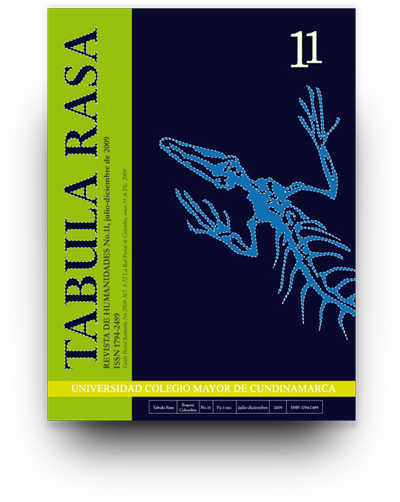Social Inequality Unthought. Exposing Blind Spots through Views from Below
Desigualdad social reconsiderada – descubriendo puntos ciegos a través de vistas desde abajo
Show authors biography
On the basis of arguments put forth by gender studies, dependency/world-system approaches as well as by present-day Latin American postcolonial theories, the paper pleads for a global sociology of social inequality premised on three substantive correctives of the mainstream social inequality research: First, a shift from the focus on the nation-state as sole unit of analysis to a global focus encompassing worldwide center periphery relations alongside nationwide and regional inequalities and the connections between them; second, a systematic and explicit engagement with the theories of social change implicit in concepts of social inequality and the conclusions entailed for the corresponding definition of modernity and the modern; and third, an emphasis on the dynamics behind the emergence of categories along which inequality structures were historically constructed, i.e., on processes of othering such as gendering, racialization, and ethnicization, rather than static categories such as gender, race, and ethnicity.
Article visits 83 | PDF visits 55
Downloads
Acker, J. 1992. “Making Gender Visible”, en Wallace, R. A. (ed.) Feminism and Sociological Theory, Londres: Sage.
Allen, W. R. y A. Y. Chung. 2000. “‘Your Blues Ain’t Like My Blues’: Race, Ethnicity and Social Inequality in America”, Contemporary Sociology, 29 (1): 796-805.
Bader, V. M. 1998. ‘Ethnizität, Rassismus und Klassen’, in Bader, V. M., Benschop, A., Krätke, M. R., y van Treeck, W. (eds) Die Wiederentdeckung der Klassen, Hamburg: Argument.
Baechler, J. 2007. “But What Is Sociology?”, European Journal of Social Theory, 10 (2): 200-205.
Beck, U. 1986. Risikogesellschaft, Frankfurt a. M.: Suhrkamp.
Beck, U. 2004. Der kosmopolitische Blick. Oder: Der Krieg ist Frieden, Frankfurt a. M.: Suhrkamp.
Berger, P. A. 2003. ‘Kontinuitäten und Brüche. Herausforderungen für die Sozialstrukturund Ungleichheitsforschung im 21. Jahrhundert’, en Orth, B., Schwietring, T., y Weiß, J. (eds) Soziologische Forschung: Stand und Perspektiven, Opladen: Leske + Budrich.
Berger, P. A. y S. Hradil. 1990. ‘Lebenslagen, Lebensläufe, Lebensstile’, Soziale Welt, edición especial 7, Gotinga.
Bergesen, A. J. y M. Bata. 2002. “Global and National Inequality: Are They Connected?”, Journal of World-Systems Research, VIII (I): 130-144.
Bhambra, G. 2007. “Sociology and Postcolonialism: Another ‘Missing’ Revolution?”, Sociology, 41( 5): 871-884.
Boatcă, M. 2008. ‘Lange Wellen des Okzidentalismus’, en Dietze, G., Brunner, C., y Wenzel, E. (eds.) De/Konstruktionen von Okzidentalismus, Bielefeld: transcript
(forthcoming).
Boatcă, M. 2009. “Class vs. Other. Selective Incorporation of Migrants into Theory”, en: Mielans, E. y Jones, T. (eds) Flows of Money and People in the World-System, Londres/Boulder: Paradigm (de próxima aparición).
Böröcz, J. 1997. “Stand Reconstructed: Contingent Closure and Institutional Change”, Sociological Theory 15 (3): 215-248.
Bös, M. 2005. Rasse und Ethnizität. Zur Problemgeschichte zweier Begriffe in der amerikanischen Soziologie, Wiesbaden: VS-Verlag.
Caillé, A. 2007. “Introduction to Symposium”, European Journal of Social Theory, 10 (2): 179-183.
Castells, M. 1998. The Information Age: Economy, Society, and Culture, Malden: Blackwell.
Chatterjee, P. 1993. Nationalist Thought and the Colonial World: A Derivative Discourse, Minneapolis: University of Minnesota Press.
Chernilo, D. 2006. “Social Theory’s Methodological Nationalism. Myth and Reality”, European Journal of Social Theory 9 (1): 5-22.
Connell, R. 1997. “Why Is Classical Theory Classical?”, American Journal of Sociology, 102 (6) 1511-57.
Connell, R. 2007. Southern Theory. The Global Dynamics of Knowledge in Social Science, Crows Nest: Allen&Unwin.
Dahrendorf, R. 1974. ‘Über den Ursprung der Ungleichheit unter den Menschen’, en Dahrendorf, Ralf (ed.) Pfade aus Utopia. Zur Theorie und Methode der Soziologie, Múnich: Piper: 352-379.
Dussel, E. 1995. The Invention of the Americas. Eclipse of “the Other” and the Myth of Modernity, Nueva York: Continuum.
Dussel, E. 1996. The Underside of Modernity, Nueva Jersey: Humanities Press.
Dussel, E. 2002. “World-System and ‘Trans’-Modernity”, Nepantla: Views from South 3.2., 221-243.
Dussel, E. 2007. Política de la Liberación. Historia mundial y crítica, Madrid: Trotta.
Eder, K. 2001. ‘Klasse, Macht und Kultur. Zum Theoriedefizit der Ungleichheitsforschung’, en Weiß, A., Koppetsch, C., Scharenberg, A., y Schmidtke, O. (eds) Klasse und Klassifikation. Die symbolische Dimension sozialer Ungleichheit, Wiesbaden: Westdeutscher Verlag.
Freud, S. 1955. ‘Eine Schwierigkeit der Psychoanalyse’, en Gesammelte Werke, XII, Londres.
Geißler, R. 2001. ‘Sozialstruktur und gesellschaftlicher Wandel’, in Korte, K.-R., y Weidenfeld,
W. (eds) (2001) Deutschland – Ein TrendBuch. Fakten und Orientierungen, Bonn: bpb. Glazer, N. y D. P. Moynihan. (eds.). 1975. Ethnicity: Theory and Experience, Cambridge, Mass.: Harvard University Press.
Gottschall, K. 2000. Soziale Ungleichheit und Geschlecht. Kontinuitäten und Brüche, Sackgassen und Erkenntnispotentiale im deutschen soziologischen Diskurs, Leske+ Budrich: Opladen.
Grosfoguel, R. 2006. “Preface”, en From Postcolonial Studies to Decolonial Studies: Decolonizing Postcolonial Studies, Review XXIX (2): 141-143.
Habermas, J. 1984. The Theory of Communicative Action, Londres: Heinemann.
Heidenreich, M. 2006 ‘Die Europäisierung sozialer Ungleichheiten zwischen nationaler Solidarität, europäischer Koordinierung und globalem Wettbewerb’, en Heidenreich, M. (ed.) Die Europäisierung sozialer Ungleichheit. Zur transnationalen Klassen- und Strukturanalyse, Frankfurt am Main, Nueva York: Campus.
Hesse, B. 2007. “Racialized modernity. An analytics of white mythologies”, Ethnic and Racial Studies 30 (4): 643-663.
Hoffman, K. y M. A. Centeno. 2003. “The Lopsided Continent: Inequality in Latin America”, Annual Review of Sociology, 29: 363-390.
Hurst, C. E. 2007. Social Inequality. Forms, Causes, and Consequences, Boston: Pearson.
IPEA – Instituto de Pesquisa Econômica Aplicada (2007) «Igualdade Racial», Políticas Sociais: Acompanhamento e Análise, Edición Especial 13, Brasilia, http://www.ipea.gov.br/ sites/000/2/publicacoes/bpsociais/bps_13/ IgualdadeRacial.pdf (14.01.2008).
Klinger, C. G. y Knapp. 2007. ‘Achsen der Ungleichheit-Achsen der Differenz. Verhältnisbestimmungen von Klasse, Geschlecht, „Rasse“/Ethnizität’, en Klinger, C.,




